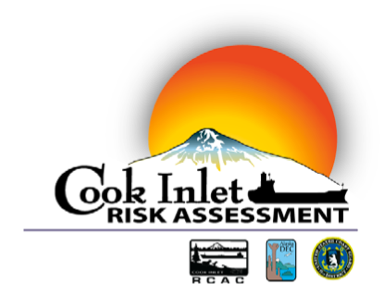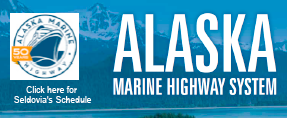Cook Inlet Risk Assessment Seeks Ideas to Lower Risks of Maritime Accidents
 For immediate release
For immediate release
January 16, 2013
Contact: Tim Robertson, 907.234.7821
Cook Inlet Risk Assessment seeks ideas to lower risks of maritime accidents
The Cook Inlet Risk Assessment Advisory Team is considering risk reduction measures for Cook Inlet and opening the door for the public to weigh in with their ideas. The U. S. Coast Guard, Cook Inlet Regional Citizens Advisory Council, and the Alaska Department of Environmental Conservation created the Cook Inlet Risk Assessment to analyze the risks associated with marine vessel operations in the inlet and recommend measures to reduce the chances of accidents and resulting oil spills.
A risk reduction measure can be any policy, procedure, rule, equipment, system, or service that would lower the chance of a marine incident or reduce the impact of an incident if it should occur. It can be something fairly obvious or traditional such as a Vessel Traffic System that monitors and controls the movement of vessels transiting Cook Inlet. Or, it may be something less obvious, such as a sub-sea pipeline that would take the place of tankers moving oil across Cook Inlet.
The Advisory Panel will consider all suggestions for further study. A list of some risk reduction measures already slated for consideration is posted on the project website at www.cookinletriskassessment.com. People are invited to submit ideas and/or share their thoughts about the options that have already been suggested.
Ideas for risk reduction measures can be submitted by email to ciracomments@nukaresearch.com, by mail to CIRA Comments, Nuka Research, PO Box 175, Seldovia, AK 99663, or by fax to (240) 394-4855. The deadline for comments is February 4, 2013. The Advisory Panel will meet in late February to consider all suggestions.
The Cook Inlet Risk Assessment project is guided by a Management Team, comprised of the agencies noted above, and an Advisory Panel of 14 stakeholders including mariners, marine pilots, port directors, fishermen, subsistence users, and other experts. Thus far, they have completed three technical studies analyzing the vessel traffic, accident frequencies, and potential consequences from spills.
-END-
Background: The Cook Inlet Regional Citizens Advisory Council (Cook RCAC), Alaska Department of Environment Conservation and U.S. Coast Guard launched the Cook Inlet Risk Assessment to examine the risk of oil spills posed by the marine vessels transiting through, near and/or servicing the region. The goal of the risk assessment is to answer the following questions:
• What can go wrong?
• How likely is it?
• What are the impacts?
• Can the impacts be mitigated?
The risk assessment is examining the current types and sizes of vessels plying Cook Inlet and dominant accident types and identifying future oil spill risks based on vessel size, type and frequency. The first phase of the risk assessment was limited to a semi-qualitative analysis, relying primarily on historical data, expert opinion, and lessons learned from prior studies. Study results provided a basis for the identification and initial ranking of risk reduction measures.
We have sought extensive stakeholder engagement throughout the process of defining and analyzing risks and identifying risk reduction measures.
Initial funding for the risk assessment was secured through a legislative appropriation by State of Alaska and is being administered by the Kenai Peninsula Borough and Cook Inlet RCAC.
More information can be obtained at www.cookinletriskassessment.com
For more information: Lynda Giguere, 907.398.6205 or Giguere@circac.org
Category: Uncategorized






 Seldovia Time
Seldovia Time





